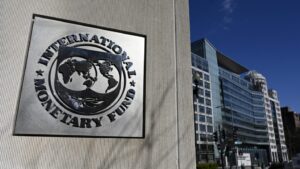IMF Urges Nigeria and Others to Extend Monetary Tightening Measures to Curb Inflation

IMF Urges Nigeria and Others to Extend Monetary Tightening Measures to Curb Inflation
Inflation—the invisible thief that silently erodes the value of money—continues to plague economies worldwide. In a recent statement, the International Monetary Fund (IMF) has issued a call to action for nations like Nigeria to extend their monetary tightening regimes to rein in surging inflation. This recommendation comes at a pivotal time, as central banks grapple with balancing economic growth and price stability. But what does this mean for Nigeria and other developing economies? Let’s dive into the complexities of monetary policy, its implications, and why a prolonged approach could be the answer.
Inflation isn’t just an economic buzzword—it’s a real challenge affecting daily life. From skyrocketing food prices to climbing energy costs, inflation has far-reaching consequences for both individuals and businesses. In Nigeria, inflation remains stubbornly high, driven by factors such as supply chain disruptions, exchange rate volatility, and fiscal deficits.
The IMF argues that prolonged monetary tightening—raising interest rates and controlling money supply—is essential to prevent inflation from spiraling further. While this approach can slow economic activity, it ultimately helps stabilize purchasing power, a crucial need for millions struggling with rising living costs.
Short-term monetary tightening has been a popular approach among central banks globally. However, the IMF believes that a longer regime is necessary for economies like Nigeria, where inflationary pressures are deeply entrenched.
A longer tightening period allows policymakers to address core inflation drivers, such as structural inefficiencies and excessive liquidity in the system. Moreover, it gives time for interest rate adjustments to filter through the economy, impacting lending, spending, and savings behaviors.
For Nigeria, where inflation reached 25.8% in September 2024, the need for a comprehensive and sustained monetary strategy cannot be overstated. The IMF’s warning underscores the importance of not easing policies prematurely, as doing so could undo progress and reignite inflation.
While the IMF’s recommendation aims to stabilize prices, monetary tightening is not without its challenges. Higher interest rates can discourage borrowing and investment, slowing economic growth in the short term. For a developing economy like Nigeria, which relies heavily on small and medium-sized enterprises (SMEs), this could have ripple effects.
However, experts argue that the trade-off is necessary. Stabilizing inflation creates a more predictable economic environment, which is essential for attracting foreign investment and fostering long-term growth. The Central Bank of Nigeria (CBN) has already raised interest rates several times in recent months, but the IMF suggests there’s more work to be done.
Rising interest rates also impact government borrowing costs. With Nigeria’s debt burden already significant, the cost of servicing loans could increase, adding further strain to public finances. This highlights the delicate balancing act policymakers must perform.
Nigeria is not alone in this battle. Countries like the United States and Brazil have also adopted prolonged monetary tightening regimes to tackle inflation. The U.S. Federal Reserve, for example, has implemented a series of rate hikes, signaling its commitment to taming inflation despite concerns about recession risks.
Brazil, on the other hand, has successfully reduced inflation through a combination of monetary tightening and structural reforms. By improving supply chains, enhancing productivity, and diversifying its economy, Brazil has created a more resilient framework to combat inflationary pressures.
For Nigeria, adopting similar structural reforms alongside monetary measures could yield significant benefits. Addressing issues like inefficient fuel subsidies, boosting agricultural productivity, and investing in infrastructure could complement the CBN’s monetary policies, providing a holistic solution to inflation.
Monetary policy alone cannot shoulder the burden of controlling inflation. Fiscal policy must play a supportive role to ensure success. For Nigeria, this means reducing fiscal deficits, curbing wasteful spending, and enhancing revenue generation through tax reforms and diversification.
The IMF has emphasized the need for coordinated efforts between fiscal and monetary authorities. For instance, reducing fuel subsidies, a significant drain on Nigeria’s budget, could free up resources for critical investments in education, healthcare, and infrastructure.
Additionally, improving tax collection efficiency and broadening the tax base could help the government generate sustainable revenue, reducing its reliance on borrowing. These measures, combined with monetary tightening, can create a more stable and resilient economy.
Despite the IMF’s recommendations, implementing a prolonged monetary tightening regime comes with significant challenges. Public resistance to higher borrowing costs and slower economic growth could pressure policymakers to ease restrictions prematurely.
Furthermore, political considerations often influence economic decisions, particularly in election years. Ensuring that monetary policy remains independent and focused on long-term goals is crucial for success.
Nigeria must also address external factors, such as global oil prices and exchange rate fluctuations, which significantly impact its economy. A coordinated approach involving both domestic reforms and international cooperation is essential to navigate these complexities.
The IMF’s call for Nigeria and others to extend monetary tightening measures highlights the critical need to tackle inflation comprehensively. While the path ahead is fraught with challenges, the potential rewards—stabilized prices, increased investor confidence, and sustainable growth—make it a necessary journey.
For Nigeria, the road to economic stability requires bold and decisive action. By adopting a longer monetary tightening regime and complementing it with structural reforms and sound fiscal policies, the nation can lay the foundation for a brighter, more prosperous future. The question now is: Will Nigeria seize this opportunity to address its inflation woes, or risk falling further behind in the global economic race?
!!!
-
 Fvreign – Feeling You
Fvreign – Feeling You
-
 ShugaVanilla’s Soulful Cover of “Waiting in Vain”
ShugaVanilla’s Soulful Cover of “Waiting in Vain”
-
 Stanley Abalu – It Shall Be Well
Stanley Abalu – It Shall Be Well
-
 Mo Eazy Unveils His Deeply Spiritual and Transformative EP ‘Ibẹrẹ’—Featuring the Uplifting Lead Single ‘Teriba’
Mo Eazy Unveils His Deeply Spiritual and Transformative EP ‘Ibẹrẹ’—Featuring the Uplifting Lead Single ‘Teriba’
-
 Ego Fire – Bololo
Ego Fire – Bololo
-
 Prophetess Chinwendu Israel – Ihe Inyoro Chukwu
Prophetess Chinwendu Israel – Ihe Inyoro Chukwu
-
 JAYO Records Announces the Release of Frenzyoffixial’s New Single “Cigarette” — A Raw and Emotional Exploration of Love and Escape
JAYO Records Announces the Release of Frenzyoffixial’s New Single “Cigarette” — A Raw and Emotional Exploration of Love and Escape
-
 Humblesmith Featuring Umu Obiligbo -Bolingo
Humblesmith Featuring Umu Obiligbo -Bolingo
-
 Frenzyoffixial – Cigarette
Frenzyoffixial – Cigarette
-
 KanBuja Ft. Monstarrboi – Kanbuja
KanBuja Ft. Monstarrboi – Kanbuja
-
 Rhedi – I Need
Rhedi – I Need
-
 Music: P-Rex – I get God Ft Derry
Music: P-Rex – I get God Ft Derry
-
 Bpm Boss – Omo Ologo (Prod By Tite Tunez)
Bpm Boss – Omo Ologo (Prod By Tite Tunez)
-
 Oluwasemilore – Working on Myself
Oluwasemilore – Working on Myself
-
 Tunde Omomeji – LOML
Tunde Omomeji – LOML
-
 ALBUM: Shaddy Jay – Voyage
ALBUM: Shaddy Jay – Voyage
-
 Music Minister, Ebi Gold Returns With, “Step In” New Single (+Lyric Video)
Music Minister, Ebi Gold Returns With, “Step In” New Single (+Lyric Video)
-
 FULL EP: Bobby Bankz – The Trada
FULL EP: Bobby Bankz – The Trada
-
 Ora Records Signs young star – BECINI
Ora Records Signs young star – BECINI
-
 Emeka Pavel – CMED (Catch Money, Escape Death)
Emeka Pavel – CMED (Catch Money, Escape Death)
Do you find Tmaq Media useful? Click here to give us five stars rating!

